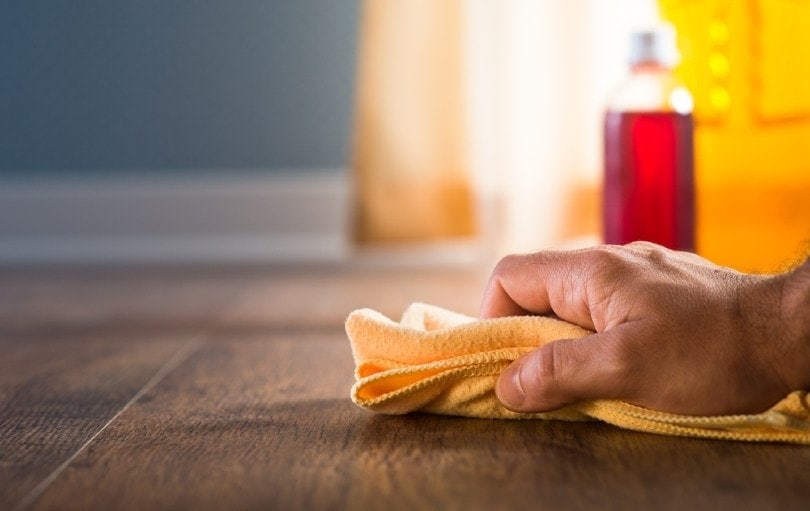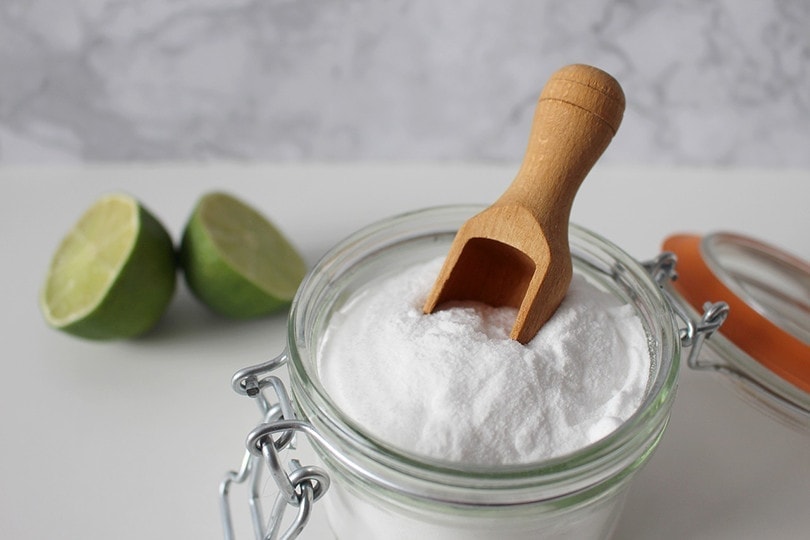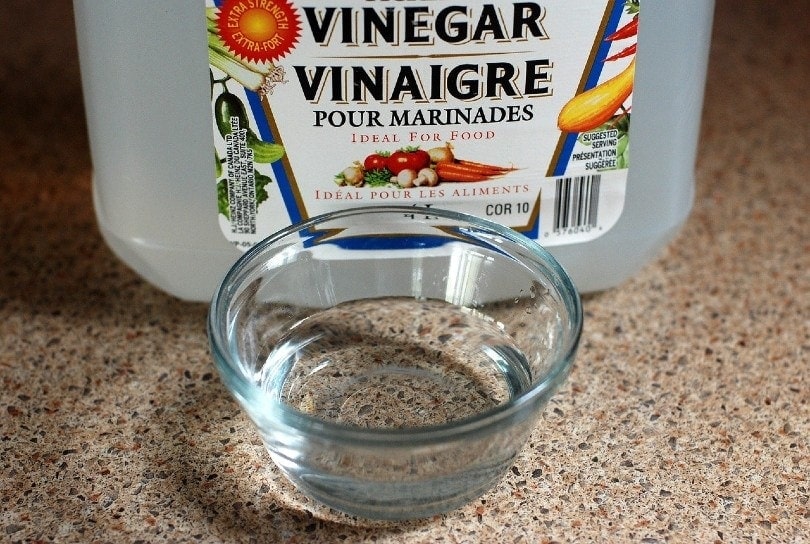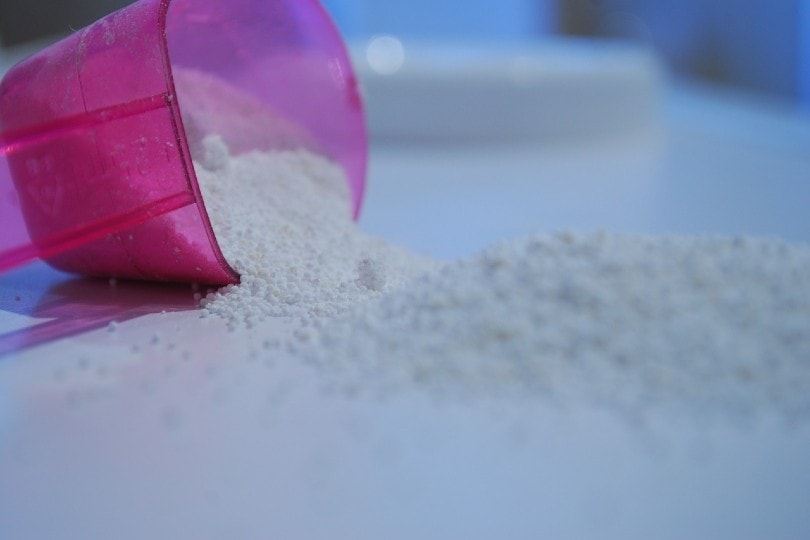How to Remove Black Urine Stains from Hardwood Floors: 8 Proven Methods

Updated on

The only thing worse than cleaning up a fresh urine mess is cleaning up urine that’s turned into a serious stain. If you have hardwood floors with black urine stains on them, the job isn’t going to be easy! Black stains usually come when the stain sinks deep into the finish, making it hard to clean up.
The methods here range from simple and easy to intensive, and not every method will work on every stain.
Top 8 Ways to Remove Black Urine Stains from Hardwood Floors
1. Baking Soda

Tools Needed: Baking soda, cleaning cloths, water
One of the simplest ways to remove a urine stain from hardwood floors is by using baking soda. Urine is usually slightly acidic, so baking soda breaks down the acids in urine and removes moisture just as well as it neutralizes odors. Unless your area is damp or humid, you may want to use water to create a paste. Then scrub it into the stain and let it dry before wiping or vacuuming it off.
- Easy and cheap
- Uses common household materials
- Neutralizes odors
- Works best on surface stains
- Might not remove discoloration
2. Hydrogen Peroxide
Tools Needed: Hydrogen peroxide, cleaning cloths, water, spray bottle
Hydrogen peroxide is another effective chemical for removing stains. Dilute the peroxide with water and spray liberally over the area. Allow it to soak for at least twenty minutes before cleaning it with a damp towel. Hydrogen peroxide is great for breaking down surface urine stains without damaging hardwood floors and will leave your floor looking shiny and clean.
- Easy and cheap
- Gets tough surface stains out
- Won’t damage the flooring
- Won’t get deep stains
3. Enzyme Cleaner
Tools Needed: Enzyme, cleaning cloths, water
An enzyme-based cleaner uses natural or synthetic enzymes to break down messes like pet stains. Enzyme cleaners made especially for pet urine are formulated to break down odors and stains with minimal damage to your floors. They are a great step up from cleaners made from home ingredients. Although they are slightly more expensive than home cleaners, they are still pretty cheap overall.
Our favorite enzyme cleaner is the Hepper Advanced Bio-Enzyme Pet Stain & Odor Eliminator Spray. It's our product, and we love it so much, we just have to share. It permanently removes the very worst smells and stains (yes, everything you can imagine!), and we offer a 100% satisfaction guarantee!
- ADVANCED ENZYMATIC CLEANER - Penetrates the most stubborn smells and stains at the deepest molecular...
- FOR ANY MESS, ON ANY SURFACE - This pet odor eliminator cleans your carpets, floors, furniture,...
- Breaks down urine easily
- More powerful than homemade cleaners
- Eliminates odors
- Slightly more expensive
- Need to plan and purchase
4. Vinegar and Grapefruit Oil

Tools Needed: Vinegar, grapefruit essential Oils, cleaning cloths, spray bottle
You can also use vinegar to clean black urine stains from your hardwood floors. Vinegar won’t neutralize acids as baking soda does, but it will make it easier to lift tough urine stains. A few drops of grapefruit essential oils in the spray bottle will help make your cleaner more effective because of grapefruit’s natural antiseptic properties. The smell of grapefruit or other citrus oils is also generally repellent to dogs and cats, making it less likely your pet will have a repeat accident.
- Antibacterial
- Reduces the likelihood of repeat urinating
- Slightly less accessible
- Won’t get deep stains
- Might not catch all odors
5. Vinegar and Soap
Tools Needed: Vinegar, dish soap, cleaning cloths, water.
If the stained area is greasy or dirty, including dish soap in your cleaning solution can help break down grease and remove the last traces of the stain. Create a solution of 75% dish soap and 25% vinegar. Add warm water. Scrub the stain with a wet rag soaked in the solution, and then use a clean rag to rinse the soap away from the floor.
- Works on greasy and dirty stains
- Easy and cheap
- Doesn’t work on all stain types
6. Bleach

Tools Needed: Bleach, cleaning cloths
Bleach can also be used to clean and lighten dark stains. Rub a small amount of bleach onto the stain, and then wait a few hours for it to dry. Repeat with a second coat of bleach and then allow the stain to dry for a day or so. If the bleach has lightened the stain, you can bleach it a few more times. However, be careful as bleach may damage the finish and might interact with fresh urine to cause fumes.
- Lightens dark stains
- May work on tricky stains
- May damage finish
- Usually requires several applications
- Use caution when cleaning with bleach
7. Sandpaper and Refinishing
Tools Needed: Sandpaper, wood stain, sealant
If the stain has sunk deep into the finish of the floor, there might not be anything for it except removing the finish. Start with rougher sandpaper to strip the finish, and then use fine-grain sandpaper to smooth out the floor. Don’t sand too deeply into the wood, or you’ll be left with a divot. Finally, you’ll have to refinish and reseal the wood. One drawback of this method is that it’s hard to match the stain perfectly. It also may not remove odors if they are already deep into the wood itself.
- Gets deep stains out
- Removes stain completely
- More work
- Hard to match perfectly
- Possibly more expensive
- May not remove odor
8. Combination Method
Tools Needed: Combination of the above
If the above methods aren’t a great choice on their own, a combination of methods can combine some of the positives of each method to make a customized cleaning solution. For example, a baking soda solution can get rid of lingering odors after using a different cleaning method to get rid of the stain.
For most of these solutions, you’ll want to work sequentially, cleaning with one method and then the next. Combining different cleaning solutions can have mixed results. Some chemical and enzyme-based cleaners can be dangerous when mixed with household cleaners. Mixing baking soda and vinegar isn’t dangerous, but the acid and base in the solution will cancel each other out, making them less effective.
- Customizable
- Perfect for getting tough stains out
- Takes more time
- More experimental
Final Thoughts
We hope these methods will help you remove tough stains on your hardwood floors. However you choose to deal with a stain, expect it to take some time and work to get the stain scrubbed out. But the result is worth it—a home that’s free of smells and unsightly stains, with a beautiful hardwood floor that you can be proud of.
Featured Image Credit: Stokkete, Shutterstock









